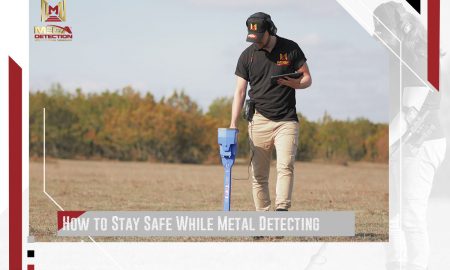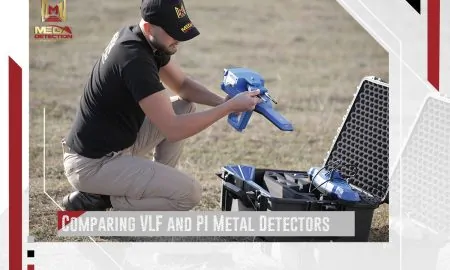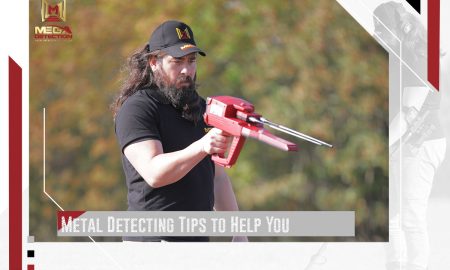Top 5 Questions About Choosing the Right Metal Detector
Metal Detecting for treasures opens up a new world of excitement and outdoor adventures not only for you but can also be a great way for your family and friends to join in a fastest-growing hobby.
Metal Detecting is a fun way to enjoy the outdoors exploring for valuable treasures of all kinds. Not only is Metal Detecting a fun hobby & sport but it’s the only hobby we know that pays for itself with the money and valuables you find. So, what’s the best metal detector for you?
What to Look for in a Metal Detector
The best metal detectors are the ones that are right for your personal wants and needs. Depending on where you live, your budget, and what you’re interested in finding – there are a number of different metal detectors you can choose from.
1. What is it You Want to Find?
Define Your Interests – Coins, Rings, Jewelry, Gold Nuggets, Relics, Artifacts & Antiques? Most metal detectors manufactured today, are all-purpose detectors that will find everything from coins, rings, and jewelry to relics and even Gold – and they’re available within every price range.
These detectors are perfect for finding just about anything you could want. All are easy to use for beginners, retirees and Seniors, and very affordable.
If your main goal is to have fun and adventure plus get some exercise, there are plenty of places to go searching for coin and jewelry hunting. You’ll want an all-purpose metal detector with exceptional pinpointing abilities and discrimination features to eliminate trash and junk targets.
Searching for relics, artifacts, buried coins and treasure caches? You’ll need a deeper seeking detector that are some favorites of serious treasure hunters, a little higher price for a lot more depth.
If it’s natural gold (Gold Nuggets – Gold Flakes) that you’re after, you’ll need a detector that operates at a higher frequency with smaller coils or special-shaped coils and is more sensitive to smaller gold which is harder to register on standard detectors. all are medium priced. Higher priced and Super Deep gold detectors
2. Where Will You be Metal Detecting Most of Your Time?
Parks, Schools, Fairgrounds, Mountains, Beaches, in the Water?
Think about where you’ll be hunting the majority of the time. If you plan to be searching in your neighborhood parks, playgrounds, old schoolyards, fishing- hunting camps, and many other dry ground sites, then an all-purpose metal detector is the one for you, and there are many to choose from.
If you live close to lakes or rivers and want to hunt the edges of the water for lost rings coins and jewelry, most all-purpose metal detectors have waterproof search coils that are safe for shallow water.
However, if you live close to a saltwater ocean, rivers or lakes and want to go into the water where the entire metal detector can be submerged or dropped into the water, then you’ll need an underwater/beach/land metal detector that has a waterproof housing, and one that can find treasures without the signal being disrupted by the conductivity in saltwater or on a wet sandy beach. More Gold Rings and Jewelry are found at ocean beaches and lake swimming areas than anywhere else.
3. How Often Will You be Detecting?
Do you want to metal detect on the weekends or whenever you can? Are you retired and planning to treasure hunt as much as possible even taking your detector with you on vacations? Are you an active or inactive Senior looking for a fun activity that adds exercise benefits? Chances are you’ll become addicted to this great hobby just like the rest of us, so you’ll want to consider how your detector stands up to repeated use.
Be honest with yourself. How rough will you be on your machine? You might not plan on dropping it, but you probably will. Think about all the bumps and jolts your machine will have to handle in the trunk of your car or if dropped on rocky terrain. The bottom line is that you’ll want a rugged machine that is built to last and you’re lucky, most detectors today are built to rigorous international standards to stand up to hard use if encountered.
4. How Much Experience do You Have?
Don’t worry if you’ve never metal detected before. Most modern machines feature Quick Start settings that make treasure hunting as easy as installing batteries and turning on the detector. With the push of a button, pre-set discrimination settings let you zero-in on finds like old coins, diamond rings, and gold nuggets while filtering out iron junk. Automatic tuning helps you calibrate your detector for different ground conditions and cancel out interference from power lines. You don’t have to master everything about your detector right away – the in-depth features will be waiting for you when you’re ready for them
There’s no shortage of detectors that are powerful, yet simple enough to guarantee an excellent experience for operators of all experience levels.some detectors will give any beginner tons of hassle-free treasure hunting adventures. Other machines are designed with intuitive features that keep the learning curve low for newcomers and experienced detectorists, alike.
5. How Much do You Want to Spend?
Metal detecting is a hobby that pays for itself, so don’t think of your new metal detector as an expense; think of it as an investment for fun, adventure and excitement for you, your family and probably friends once they see all the money, rings and other valuables you find!
Our advice is simple – buy the best you can afford! The better your detector, the more sensitive it will be, and the deeper it will penetrate. In general, the more expensive the detector, the more features, and automation it will have, the easier it will be to tune, and the more versatile and durable it will be. Whatever your budget, be it $200, $500, $1000, or more.
Remember… the wealth you find with your detector adds up quickly. A single killer find like a diamond ring, gold bracelet, or an old coin with a rare mint mark could pay for your detector and then some. We hear from people nearly every week about that one find that paid for their detector – it’s far more common than you think.












Leave a Reply